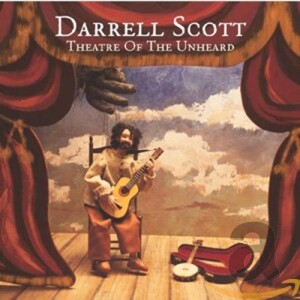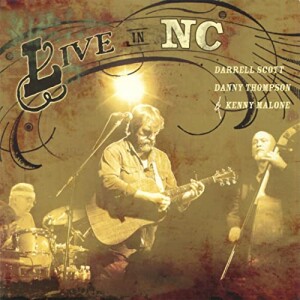 Christopher Conder wrote this review.
Christopher Conder wrote this review.
Theatre of the Unheard is a particularly significant release in Kentucky-born Darrell Scott‘s oeuvre. First recorded in 1991, it was, in Scott’s own words, the first time he found his ‘ “voice” as a writer’. Nevertheless, it was not enough to impress his record company, which declined to release it. Three albums and over 10 years later, he has rerecorded the album in his own living room and released it on his own record label. In his sleeve notes, Scott insists that he is not ‘righting some wrongs from the past’, but he has nevertheless proved his old label foolish, with what is a fine collection of songs.
Scott’s writing style is highly picturesque, portraying his narratives with detailed, vivid language. The songs are a series of vignettes, many apparently direct transcriptions from his own life, portraying his father’s problems with drink in ‘Day After Day’ and his brother’s girlfriend Sally’s power battles with her parents in ‘I wanna be free’. Scott knows how to create a memorable melody too, a lift from Ian Dury’s ‘Sex and Drugs and Rock ‘n’ Roll’ for the track ‘Miracle of Living’ notwithstanding.
So why do I have reservations? Perhaps this says more about my prejudices than the record, but I find the deeply earnest nature of it somewhat embarrassing, in much the same way I have a problem with Bruce Springsteen. The overwhelming tone of the album is one of nostalgic regret: Opener ‘East of Gary’ looks upon his unutterably changed hometown and laments, ‘Oh the good old days are just good and gone’, ‘Uncle Lloyd’ wonders ‘how a man at fifty-seven / Winds up living so alone’, ‘Day After Day’ yearns for a life that cannot be, ‘The Man Who Could Have Played Bass for Shanana’ is yet another tale of missed opportunities. Believe me, I could go on. This follows through into Scott’s voice, which comes across as overly affected, as if he is trying to wring every last drop of emotion out of it, when a toned down approach would carry his material far more poignantly. What is more, although some of the instrumental arrangements work very well, such as the atmospheric strings and saxophone on ‘10,000 Miles Away’, there is a tendency towards the over-egged. Scott himself plays as many as four different instruments on each track, and surrounds himself with an array of other musicians and singers, including Danny Thompson on double bass, Kenny Malone on drums, Steve Nathan on organ and Suzi Ragsdale and John Cowan on vocals. The result too often is an over-busy sound that detracts from the songs.
 Which is where Live in NC comes in. A stripped down affair, it features Scott with studio stalwarts Danny Thompson and Kenny Malone. Thompson I was already aware of as a legendary double bassist, best known for his work within the British folk rock scene in the band Pentangle, and as accompanist to the likes of Richard Thompson and John Martyn. With a few exceptions, Thompson’s playing is criminally hidden on the studio (or should that be living room?) album; here it is present in all of its spine tingling majesty. Malone is new to me, although a well known drummer in Nashville, and proves himself to be a sympathetic and invented percussionist.
Which is where Live in NC comes in. A stripped down affair, it features Scott with studio stalwarts Danny Thompson and Kenny Malone. Thompson I was already aware of as a legendary double bassist, best known for his work within the British folk rock scene in the band Pentangle, and as accompanist to the likes of Richard Thompson and John Martyn. With a few exceptions, Thompson’s playing is criminally hidden on the studio (or should that be living room?) album; here it is present in all of its spine tingling majesty. Malone is new to me, although a well known drummer in Nashville, and proves himself to be a sympathetic and invented percussionist.
The setlist of the album is only half comprised of Scott originals, an effective if perhaps surprising decision for such a well-known composer whose songs have been recorded by the likes of the Dixie Chicks and Travis Tritt. The covers of Johnny Cash, Townes Van Zandt and Darrell’s father, the little known but clearly talented Wayne Scott, alongside a mesmeric arrangement of the traditional standard, ‘Wayfaring Pilgrim’, unveil Scott’s classic country influences, and reveal how well his own songs fare in their company. There are only two songs from Theatre of the Unheard, whilst the troubling ‘With a Memory Like Mine’, a co-write with his father, and ‘You’ll Never Leave Harlan Alive’, best known in a recording by Patty Loveless, are standouts.
Live in NC works so much better than Theatre of the Unheard because the songs are given space, both terms of both the arrangements and timing. All of the songs but one go over the five minute mark, being allowed to unravel themselves slowly and powerfully, the rhythm section giving its best and Scott himself proving to be a talented and effective guitarist. His voice, much more relaxed, is fitting and there are times that he even shows potential to be a remarkably good singer.
In the last decade Darrell Scott has moved from making an album deemed unreleasable to becoming an in-demand songwriter. Theatre of the Unheard may do much to further that career, but it is Live in NC that most effectively argues for Scott, alongside his esteemed sidemen, as the musician and performer that the previous release only hinted at. Darrell Scott and Danny Thompson have been working on a new studio album, which is due for release in May 2006.
Green Man Review has previously reviewed Darrell Scott’s 1999 album, Family Tree.
(Full Light, 2003)
(Full Light, 2004)
